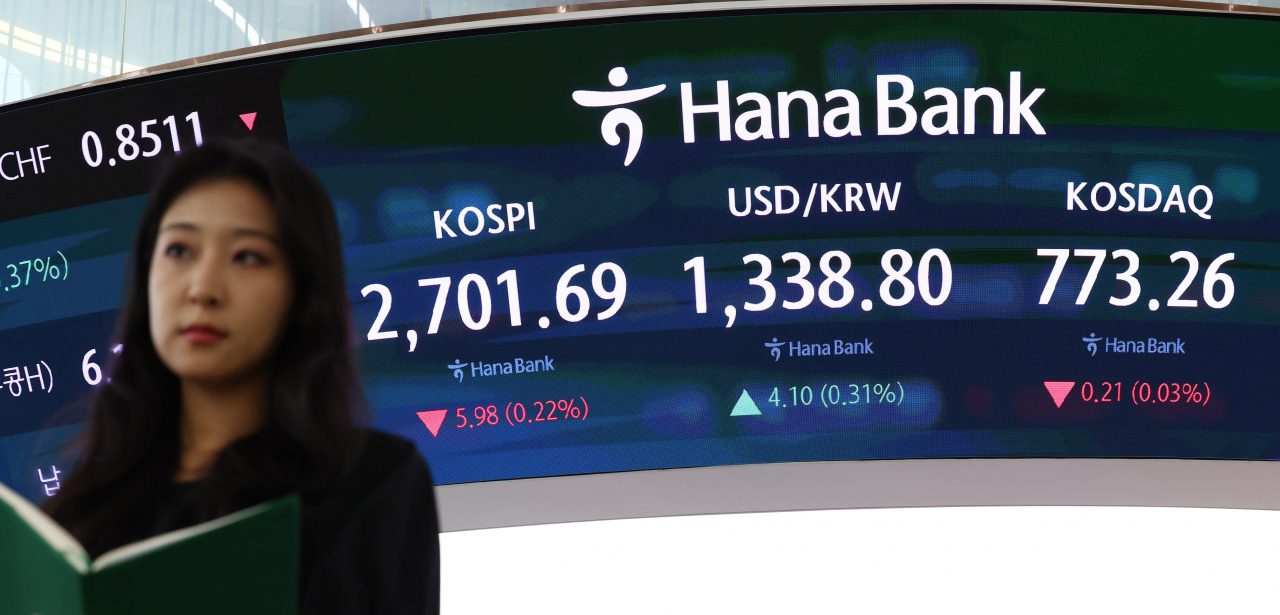Stocks & Bonds
Korea's 'value-up' efforts stall on 0.7% corporate participation
 |
An electronic board shows the Kospi's slight downtick in a dealing room at the Hana Bank headquarters in Seoul on Friday. (Newsis) |
Nearly three months after the government launched the "Corporate Value-up Program" in May, participation by South Korean companies remains minimal.
As of Friday, just eight companies had released value enhancement disclosures, representing a mere 0.3 percent of the 2,585 firms listed on the Kospi and Kosdaq, according to Korea Exchange data. Including the 10 firms that have preannounced disclosures, just 0.7 percent have joined the program.
The "value-up" initiative, rolled out by the local government in February, aims to boost corporate value and address the "Korea Discount," the persistent undervaluation of Korean stocks. The program encourages companies to voluntarily disclose their value enhancement plans, detailing goals, measures and shareholder return policies.
Participation has been dominated by financial sector firms, which are key underperforming players in the market. With Kiwoom Securities cutting the start, major banking holding firms Shinhan Financial Group and Woori Financial Group have disclosed their plans, while others such as KB Financial Group and Kakao Bank have issued prenotices.
The initiative spurred a rally in financial stocks, with the KRX Bank Index up 34 percent, the KRX Insurance Index up 31 percent and the KRX Securities Index up 20 percent this year.
Despite these gains, other sectors remain hesitant due to a lack of binding measures.
On Friday, LG Electronics became the first of Korea’s top ten conglomerates to commit, issuing a prenotice and promising official disclosure by the fourth quarter. This move followed increased pressure from financial regulators, including Wednesday's meeting led by KRX CEO Jeong Eun-bo with executives from Korea’s top conglomerates — Samsung, SK, LG and Hyundai Motor — urging them to take the lead in driving change.
Korea’s participation rate of less than 1 percent is notably low compared to Japan’s case, which the Korean government has been seeking to emulate. Japan launched a similar program in March 2023, requiring companies with a price-to-book ratio under one to submit value enhancement plans. Within four months, 13 percent of companies participated, rising to 28 percent by year-end.
The price-to-book ratio measures a company’s market price relative to its book value, with a ratio below one indicating potential undervaluation. Reports show over 50 percent of Korean listed firms have a price-to-book ratio under one, a significantly higher proportion than in other developed or thriving markets.
Market disappointment is reflected in the benchmark Kospi, which has shown minimal growth over the past three months, rising slightly from 2,683 on May 2 to 2,701 as of Friday. The Kospi fluctuated substantially during this period, peaking at 2,891 on July 11 and falling to 2,441 on Aug. 5, with no clear signs of a stable uptrend.
The value-up efforts have failed to prevent a decline in foreign investors' confidence in the Korean stock market amid rising global volatility.
Foreign investors, who bought 8.6 trillion won ($6.47 billion) in Korean stocks between Feb. 26 -- when the program was announced -- and the end of April, reduced their purchases to 4.1 trillion won from May to Friday. In May, they recorded their first net monthly sales of the year, offloading 1.3 trillion won on the Kospi.
A recent Bank of America survey of around 200 Asian fund managers highlighted skepticism toward the value-up program. According to the August survey, nearly 70 percent anticipated minimal to moderate impact, with 22 percent expecting "no significant impact" and 44 percent forecasting a "moderately positive impact."
The industry expects that the government's upcoming tax incentives will likely boost participation in value-enhancement initiatives.
In July, the Finance Ministry proposed tax code revisions, including corporate tax cuts for companies increasing shareholder returns and reduced dividend income taxes for individual investors. The revisions also featured a major overhaul of the inheritance tax system, lowering the maximum tax rate and eliminating the 20 percent surcharge on controlling stakes in major firms.
These changes will be implemented once the National Assembly approves the bill, which will be submitted by the ministry next month.
There are lingering concerns of opposition from the Democratic Party of Korea, which views the bill as "favoring the wealthy." Yet, market watchers remain optimistic about long-term value-up momentum.
“There are concerns that the government’s value-up tax support might be derailed by opposition. However, despite some differences in approach, the commitment to protecting general shareholders' rights is becoming clearer,” said Shinyoung Securities analyst Park So-yeon. “The emphasis on value stocks and value-up initiatives is expected to strengthen over time.”
Park Se-yeon, a researcher at Hanwha Investment & Securities, commented on a similar note: “The value-up policy is gaining traction across politics, business and investors. With the government’s strong commitment, there is significant potential for stock price increases in the second half of the year."
More companies outside the finance sector are expected to increase their participation as they finalize their regulatory filings over the next few weeks.
Meanwhile, the Korea Exchange is set to launch the value-up index next month, with an exchange-traded fund expected by the end of the fourth quarter.
By Choi Ji-won (jwc@heraldcorp.com)






![[From the Scene] Gigantic Olive Young store lures young trend-setters in Seongsu](http://res.heraldm.com/phpwas/restmb_idxmake.php?idx=151&simg=/content/image/2024/11/21/20241121050065_0.jpg)

